by Channon Oyeniran
 #BlackHairProblems – It’s a humorous hashtag on Twitter, but one of the big “problems” with black hair isn’t funny at all. The number of articles, news clips and stories I’ve seen and heard recently concerning black girls’ and women’s natural hair is both surprising and ridiculous. Are we really making such a big issue out of a person’s hair as to ask them to change it or “get it done” or suggest that they are breaking the school dress code…in 2017?! Seriously?! I must admit, the controversy surrounding this topic is puzzling to me in the sense that something so trivial as a person’s hair – the black person’s hair – is creating such a stir.
#BlackHairProblems – It’s a humorous hashtag on Twitter, but one of the big “problems” with black hair isn’t funny at all. The number of articles, news clips and stories I’ve seen and heard recently concerning black girls’ and women’s natural hair is both surprising and ridiculous. Are we really making such a big issue out of a person’s hair as to ask them to change it or “get it done” or suggest that they are breaking the school dress code…in 2017?! Seriously?! I must admit, the controversy surrounding this topic is puzzling to me in the sense that something so trivial as a person’s hair – the black person’s hair – is creating such a stir.
Black women can do almost anything with our hair because it is so versatile. We can make it straight, curly, wavy, we can braid it, twist it, put it in a ponytail, cut it and style and so much more! We can also do all of this with our natural hair or with aides such as extensions, weaves, hot combs, curling irons, etc. 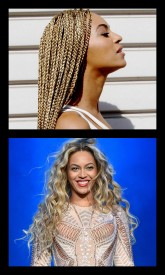 Many are now taking issue with black women choosing to wear their hair in its natural state, a trend that is growing in popularity, rather than trying to make it into some idealized view of beauty that the media and white majority have portrayed. For so long black women were told that our hair must be long, straight and flowing for us to be considered beautiful. Whether a woman chooses to go natural or not is not the issue. It is up to each individual and what she wants. The real problem is the pressure put on so many black women, from their workplaces, schools, and society, to “fit in” and conform to mainstream society.
Many are now taking issue with black women choosing to wear their hair in its natural state, a trend that is growing in popularity, rather than trying to make it into some idealized view of beauty that the media and white majority have portrayed. For so long black women were told that our hair must be long, straight and flowing for us to be considered beautiful. Whether a woman chooses to go natural or not is not the issue. It is up to each individual and what she wants. The real problem is the pressure put on so many black women, from their workplaces, schools, and society, to “fit in” and conform to mainstream society.
This uproar is not a new phenomenon. Twisted views on beauty have been forced upon black women since they were taken from their homes in Africa more than 400 years ago.  The black woman then had the western view beauty thrust upon her, internalized and then carried out among black communities. Black women who were lighter in complexion or of mixed race and had features that resembled white women were seen as “better,” and thus treated differently, than black women whose darker complexion and features were viewed “inferior.” This treatment extended to these women’s hair; in the eyes of the slave traders and owners, having long, straight, flowing hair was beautiful while having curly, short and wool-like hair was considered masculine, and unattractive. From the days of slavery, black people have had their value determined by their appearance and its proximity to whiteness. The more “white” you appeared, the more valuable you were. This has led to an enduring pressure to conform to the styles, mannerisms and culture of the white majority.
The black woman then had the western view beauty thrust upon her, internalized and then carried out among black communities. Black women who were lighter in complexion or of mixed race and had features that resembled white women were seen as “better,” and thus treated differently, than black women whose darker complexion and features were viewed “inferior.” This treatment extended to these women’s hair; in the eyes of the slave traders and owners, having long, straight, flowing hair was beautiful while having curly, short and wool-like hair was considered masculine, and unattractive. From the days of slavery, black people have had their value determined by their appearance and its proximity to whiteness. The more “white” you appeared, the more valuable you were. This has led to an enduring pressure to conform to the styles, mannerisms and culture of the white majority.
As a black woman who has worn my hair proudly in its natural state for many years (e.g. no relaxers, weaves, or extensions in my hair) and for the past two and half years worn what are called “sisterlocks” in my hair (a trademarked locking technique where the hair is parted in a precise grid, utilizing a special tool that places the hair in a locking pattern: see photo), I have taken pride in being able to just wear my hair as it is and not fill the pockets business owners, many of whom are not black, who profit very well from black people coming into their stores and spending hundreds of dollars at a time on hair care products, weaves, extensions, etc. I, too, like many other black women used to relax, aka “straighten”, my hair so that it was bone straight like white women’s hair or add weave to my hair so that I would have the hair length like a white woman. 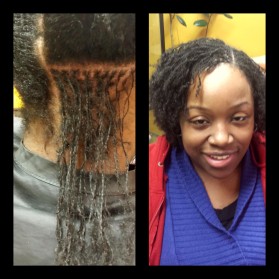 But after much money spent, and educating myself more on my history, who I am, where my ancestors came from, I came to the realization that my hair is nothing to be ashamed of or to hide or to change. My hair is beautiful, naturally curly…characteristics that many women wish they had. I also decided to not care what the media portrays to be beautiful or acceptable. The media doesn’t determine who I am or if I am beautiful or not (which I am!). Although this issue doesn’t only affect women, I will focus on three stories, from three different countries, that highlight the discrimination black women, in particular, have faced for wearing traditionally black hairstyles.
But after much money spent, and educating myself more on my history, who I am, where my ancestors came from, I came to the realization that my hair is nothing to be ashamed of or to hide or to change. My hair is beautiful, naturally curly…characteristics that many women wish they had. I also decided to not care what the media portrays to be beautiful or acceptable. The media doesn’t determine who I am or if I am beautiful or not (which I am!). Although this issue doesn’t only affect women, I will focus on three stories, from three different countries, that highlight the discrimination black women, in particular, have faced for wearing traditionally black hairstyles.
USA:
-Kayla Greaves (HuffPost Canada)
Just this past week, the story broke that fifteen-year-old twins from Boston, Deanna and Mya, have had to serve multiple suspensions since April, could potentially be suspended again for wearing box braids and were banned from school activities. According to Mystic Valley Regional Charter School’s administration, the girls’ box braids violate the school’s dress code because the code prohibits extensions, and says hair cannot be “more than 2 inches in thickness or height.” 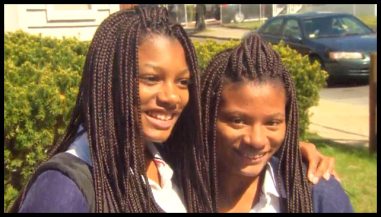 (This rule would insinuate a black student wearing their hair in an afro style would be in violation of the dress code.) Both girls are intelligent and active in school, so what’s the problem? Well, according to another parent whose daughter also wore the box braid style and was suspended, white children at the school have “coloured hair and you are not supposed to colour your hair, and they walk around like it’s nothing.” Many feel, and I agree, that these facts point to discrimination against black students who cannot simply wear their hair in a style that represents their culture, heritage and identity.
(This rule would insinuate a black student wearing their hair in an afro style would be in violation of the dress code.) Both girls are intelligent and active in school, so what’s the problem? Well, according to another parent whose daughter also wore the box braid style and was suspended, white children at the school have “coloured hair and you are not supposed to colour your hair, and they walk around like it’s nothing.” Many feel, and I agree, that these facts point to discrimination against black students who cannot simply wear their hair in a style that represents their culture, heritage and identity.
Thankfully, I came across a follow-up article to this story, which reports that the state attorney general sent a letter demanding that the school “[…] immediately stop punishing black and biracial students for wearing hairstyles the school said violate its dress code.” These are rules that the attorney general thinks are both discriminatory and unfairly enforced amongst students at the school. It’s a happy ending to this particular story as the Cook twins are again allowed to participate in their extra-curricular activities, as well as maintain their hairstyles, which represent who they are. However, these stories, which are all too common, continue to occur around the world.
Canada
-Philip Lee-Shanok (CBC News; Toronto)
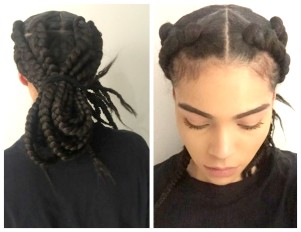 In March 2016, in Scarborough, just outside of Toronto, Zara store employee, Cree Ballah, went into work with box braids and was asked by her manager to first take her braids out of the ponytail they were in and then along with another manager tried to fix her hair to fit the so called “professional look” that Zara was trying to maintain. Not only was this experience unprofessional and discriminatory, it was also humiliating for Cree as her managers tried to fix her hair in front of the store in a busy mall and in front of her co-workers. When this happened, Cree said she would likely quit her job as well as file a complaint with the Ontario Human Rights Commission. This is yet another common example of discrimination against black women and their hair. (See this story from BBC News, ‘Wear a weave at work – your afro hair is unprofessional’.)
In March 2016, in Scarborough, just outside of Toronto, Zara store employee, Cree Ballah, went into work with box braids and was asked by her manager to first take her braids out of the ponytail they were in and then along with another manager tried to fix her hair to fit the so called “professional look” that Zara was trying to maintain. Not only was this experience unprofessional and discriminatory, it was also humiliating for Cree as her managers tried to fix her hair in front of the store in a busy mall and in front of her co-workers. When this happened, Cree said she would likely quit her job as well as file a complaint with the Ontario Human Rights Commission. This is yet another common example of discrimination against black women and their hair. (See this story from BBC News, ‘Wear a weave at work – your afro hair is unprofessional’.)
South Africa
“High-School Girls in South Africa Are Protesting for the Right to Wear Their Natural Hair”
-Claire Landsbaum (The Cut; NY magazine)
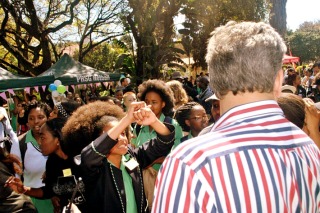 On August 29th, 2016, students at Pretoria Girls High School in South Africa, protested against the school’s hair policy that many students and parents deemed to be racist. The policy indicates that natural hair is “messy” and suspends students for wearing their hair natural. In response to the school’s policy, a petition with close to 18,000 signatures was signed along with the protest by the students and support pouring in for them via social media. The students even had the support of Arts and Culture Minister Nathi Mthethwa, who tweeted, “Schools should not be used as a platform to discourage students from embracing their African identity.” The protest, petition and support appeared to work as the high school suspended the rules about the hair policies a few days after the protest. Another triumph, but a bittersweet one, as these situations expose the deep rooted racism against people of colour across the world.
On August 29th, 2016, students at Pretoria Girls High School in South Africa, protested against the school’s hair policy that many students and parents deemed to be racist. The policy indicates that natural hair is “messy” and suspends students for wearing their hair natural. In response to the school’s policy, a petition with close to 18,000 signatures was signed along with the protest by the students and support pouring in for them via social media. The students even had the support of Arts and Culture Minister Nathi Mthethwa, who tweeted, “Schools should not be used as a platform to discourage students from embracing their African identity.” The protest, petition and support appeared to work as the high school suspended the rules about the hair policies a few days after the protest. Another triumph, but a bittersweet one, as these situations expose the deep rooted racism against people of colour across the world.
Why the Double Standard?
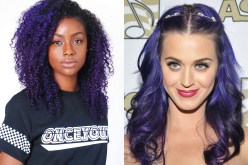 In another article, written by Elle on Black Girl with Long Hair, the author does a comparison of the inconsistency between black and white women who colour their hair and how it is seen by the general public. It is seen as “hood and ghetto” when black women colour their hair and “creative and cute” when white women do it. This issue, along with black women’s natural hair, goes deeper than just the issue of hair. As other posts on this blog have discussed time and time and time and time again, there is deep-rooted systemic racism at play here, even down to the trivial things such as a person’s hair…the hair that they were born with.
In another article, written by Elle on Black Girl with Long Hair, the author does a comparison of the inconsistency between black and white women who colour their hair and how it is seen by the general public. It is seen as “hood and ghetto” when black women colour their hair and “creative and cute” when white women do it. This issue, along with black women’s natural hair, goes deeper than just the issue of hair. As other posts on this blog have discussed time and time and time and time again, there is deep-rooted systemic racism at play here, even down to the trivial things such as a person’s hair…the hair that they were born with.
So no, the issue is not just about hair, but about the continuous racism directed towards black people and the constant effort to try and dehumanize us and make us feel “less than” in every aspect of society and life.
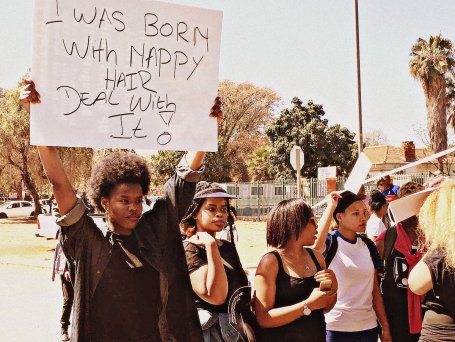
More stories of the “problems” with natural hair:
- Local teen told afro is ‘extreme’ and can’t be worn at school – WCTV
- 16-Year-Old Black Student With Natural Hair Asked By School To ‘Get Her Hair Done’ – Essence
- The Problem with White Beauty Standards – MTV Decoded
- This school just banned traditionally black hairstyles — and people are outraged. – Mic
- Braiding Hair Risks Heavy Fines, Even Jail Time, In Iowa – Forbes
Positive and uplifting stories:
- The Former And New Miss USA Both Wear Natural Hair, Twitter Reacts Accordingly – Huffington Post
- Your natural hair is beautiful… – Allure
- Meet the Romford mum encouraging black females to embrace their natural hair. – BBC
- Pretoria High School Caves Under Pressure—Suspends Racist Rules on Students’ Natural Hair – OkayAfrica
- Evelyn & Grace traded products and techniques and hilarity ensued. – NaturallyCurly.com
- How my 4-year-old taught me to love my natural hair by Georgia Lobban, SheKnows Expert
And a few more great posts on the subject…
- I Was Supposed To Have Good Hair – Ijeoma Oluo
- The Politics Of ‘Man Braids’ – Yasmine Rimawi
- The Politics of Black Hair – Emma Dabiri
UPDATED RESOURCES (These are stories, articles, etc. added after publishing.)
Black Panther, black women, and the politics of black hair – Al-Jazeera


[…] #BlackHairProblems […]
LikeLike